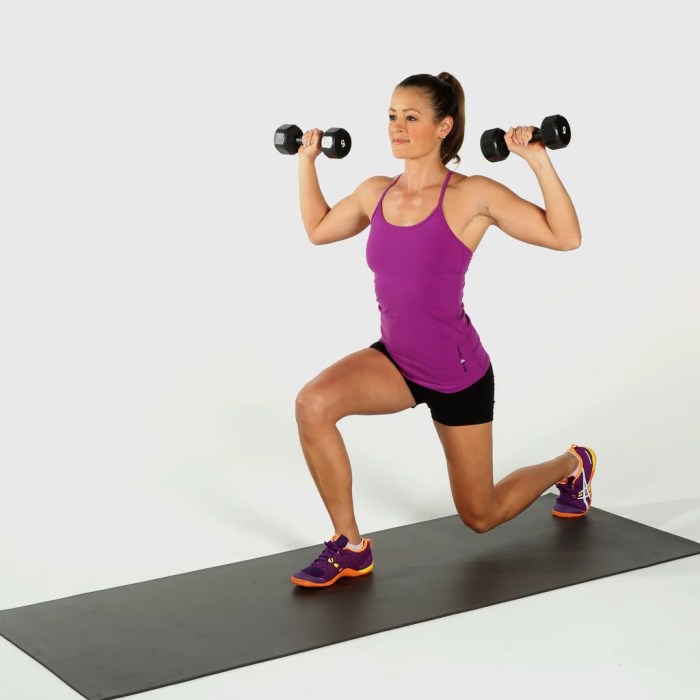Best Weight Training For Women isn’t just about building muscle; it’s a transformative journey toward enhanced physical and mental well-being. This guide delves into the science-backed benefits, crafting a personalized program that prioritizes safety and efficacy. From understanding proper form and progressive overload to navigating common misconceptions and tailoring nutrition, we equip women with the knowledge to achieve their fitness goals confidently and sustainably.
We’ll explore the physiological advantages, such as improved bone density and metabolism, alongside the psychological gains, including boosted self-esteem and stress reduction. This isn’t about becoming a bodybuilder; it’s about empowering women to harness the incredible strength-building potential of weight training, resulting in a healthier, stronger, and more confident self.
Addressing Common Concerns and Misconceptions: Best Weight Training For Women

Weight training for women remains a subject shrouded in misconceptions, often fueled by outdated stereotypes. Many women fear that lifting weights will make them bulky and masculine, hindering their pursuit of a lean, toned physique. This fear is largely unfounded, and understanding the nuances of weight training can empower women to achieve their fitness goals without sacrificing femininity.Weight training offers a powerful tool for women seeking improved fitness, regardless of their specific goals.
The reality is that building significant muscle mass requires a dedicated and highly specific training regimen, including significant caloric surplus and specialized techniques far beyond the scope of typical fitness programs. For most women, weight training leads to increased strength, lean muscle mass, improved metabolism, and a more sculpted physique – all contributing to a healthier and more confident self-image.
The key lies in selecting appropriate exercises, using correct form, and gradually increasing the intensity of the workouts.
The Relationship Between Weight Training and Femininity
The notion that weight training compromises femininity is a significant misconception. Instead of building excessive bulk, weight training typically leads to a more toned and defined appearance. Women naturally possess lower levels of testosterone, the hormone primarily responsible for significant muscle growth. This hormonal difference makes it significantly more challenging for women to achieve the same level of muscle hypertrophy as men.
Furthermore, properly designed weight training programs focusing on higher repetitions and lighter weights can enhance muscle tone and definition without adding significant bulk. The aesthetic result is often a more sculpted and feminine physique, rather than a bulky one.
Program Adjustment and Body Awareness, Best Weight Training For Women
Listening to your body is paramount in any fitness program, and weight training is no exception. Pain should never be ignored. Proper form and technique are crucial to prevent injuries. It’s essential to start with lighter weights and gradually increase the load as strength improves. Rest and recovery are also vital components.
Overtraining can lead to plateaus and injuries, hindering progress. A well-structured program incorporates rest days to allow muscles to repair and rebuild, maximizing gains and minimizing the risk of injury. Adjusting the program based on individual progress and limitations ensures sustainable and safe results.
Frequently Asked Questions Regarding Weight Training for Women
Understanding common questions and concerns is crucial for encouraging women to embrace weight training. The following points address frequently asked questions:
- Will weight training make me bulky? No, women have significantly lower levels of testosterone than men, making it difficult to build substantial muscle mass without a very specific and intense training regimen.
- What kind of weight training is best for women? A balanced program incorporating compound exercises (e.g., squats, deadlifts, bench presses) and isolation exercises (e.g., bicep curls, triceps extensions) is ideal for overall strength and muscle development.
- How often should I weight train? A frequency of 2-3 times per week, allowing for rest days between sessions, is generally recommended for optimal muscle growth and recovery.
- Do I need a personal trainer? While not mandatory, a qualified personal trainer can provide guidance on proper form, exercise selection, and program design, minimizing the risk of injury and maximizing results.
- What if I don’t see results immediately? Progress takes time. Consistency and patience are key. It’s crucial to focus on proper form and gradually increase the intensity of the workouts over time.
Ultimately, the best weight training program for women is a personalized one, adapted to individual goals, limitations, and progress. By understanding the foundational principles – proper form, progressive overload, balanced nutrition, and adequate recovery – women can embark on a powerful journey of physical and mental transformation. Remember, consistency and listening to your body are key to unlocking the transformative power of weight training.
Embrace the challenge, celebrate your achievements, and enjoy the journey to a stronger, healthier you.

